ELDER LAW
“To care for those who once cared for us is one of the highest honors.”
Tia Walker, The inspired Caregiver: Finding Joy While Caring for Those You Love
Long-Term Care Planning
Clients frequently ask us if there is any way they can save their property from the nursing home. Clients usually have witnessed a friend or a loved one who has lost practically their entire savings and been forced to sell their family farm to help pay for the nursing home.
The short answer is yes—with the right planning, it may be possible to enter a nursing home without losing all your assets. This involves structuring your finances in a way that allows you to qualify for TennCare (Tennessee’s Medicaid program), which pays for nursing home care if you meet both financial and medical requirements.
For single individuals, TennCare generally allows you to keep your home (during your lifetime), one vehicle, and up to $2,000 in cash. The rest must be spent before benefits begin—often at a rate of $10,000 per month or more. After death, TennCare can seek reimbursement from your estate, which is why many clients are concerned about preserving assets for their loved ones.
We also help identify if you may qualify for VA Aid & Attendance, a benefit available to eligible Veterans to help with long-term care costs.
There are several legal tools we use to protect assets, depending on your situation. The earlier you plan, the more options are available. If you're interested in exploring how to protect your home or savings from long-term care costs, contact us to schedule a consultation.
Advanced Medicaid Planning
Advanced Medicaid Planning is a proactive strategy designed to help individuals and families protect their assets well in advance of needing long-term care—ideally five or more years before entering a nursing home. Many people are surprised to learn that TennCare (Tennessee’s Medicaid program) has strict financial eligibility rules, and without proper planning, they may be forced to spend nearly all of their savings before qualifying for assistance.
The purpose of advanced planning is to preserve what you've worked hard for—your home, savings, and other assets—while still positioning you to qualify for Medicaid when the time comes. We use a variety of legal tools tailored to your situation, such as irrevocable trusts, strategic gifting, life estate deeds, and asset restructuring. These strategies are designed to comply with Medicaid regulations while helping you protect your legacy for your loved ones.
Every family’s needs are different, which is why we take the time to explain your options and build a personalized plan that reflects your values, goals, and financial circumstances. Planning early gives you the greatest flexibility and the most effective tools to safeguard your future. If you're thinking about how to prepare for long-term care down the road, we’re here to help you take the first step with confidence.
Medicaid Crisis Planning
Medicaid Crisis Planning is designed to help individuals and families who are facing an immediate or near-term need for nursing home care. If your loved one is already in a nursing home—or will be soon—you may feel like it’s too late to protect their assets. Fortunately, that’s not always the case. Even in urgent situations, there are legal strategies that can help preserve significant assets while still qualifying for TennCare (Tennessee’s Medicaid program).
Many people are told they must spend down all their savings before becoming eligible for benefits, but that isn’t always true. With the right planning, it’s possible to qualify for Medicaid while protecting a portion of what has been saved. Some of the tools we may use in crisis planning include Medicaid-compliant annuities, promissory notes, caregiver agreements, and the conversion of countable assets into exempt ones under Medicaid rules.
These strategies are complex and time-sensitive, but when implemented properly, they can make a real difference in preserving a family’s financial security. If you or a loved one are facing a nursing home admission and unsure where to turn, don’t wait—every day counts in a crisis. We can help guide you through the TennCare process and explore options that may still be available to protect your assets.
Conservatorships
Do you have a loved one who is unable to care for himself physically or make decisions for himself medically or financially? A Conservatorship might be an option for you to ensure that his or her well being is cared for in every way.
A Conservatorship is the process where a judge declares an individual (called the “Ward”) to be disabled, meaning he or she lacks the capacity to make decisions in one or more important areas, and identifies another individual (called the “Conservator”), as being able to make those decisions for the Ward. The main responsibility of the Conservator, first and foremost, is to take personal care of the Ward to ensure that the Ward’s needs are met from a medical and financial standpoint. The Conservator will make all medical decisions for the Ward, including but not limited to housing decisions, coordinating doctor visits, and making medical decisions as the need arises. From a financial standpoint, the Conservator is responsible for identifying and taking into the possession the Ward’s assets, investing the Ward’s assets to produce income, preparing and filing the Ward’s income tax returns, preparing and filing inventories and accounts as required by the Court, and spending the Ward’s money only on those items which the Court has approved.
We frequently represent Conservators during this process by preparing the necessary legal documentation to establish the Conservatorship, representing the Conservator in Court to prove that the Conservatorship is appropriate, and then advising the Conservator as to his or her specific duties.
Contact us today to schedule an appointment to discuss whether a Conservatorship is right for your loved one.

